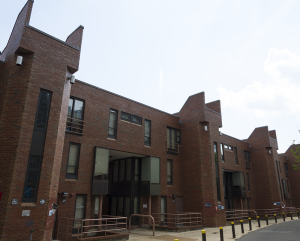
Apartments such as Village A will mostly house juniors who will be required to live on campus as of fall 2015.
Students will be required to live in university housing for three years beginning in the fall of 2015, administrators announced on Wednesday evening.The housing requirement, which administrators developed with the Georgetown University Student Association, will begin with the Class of 2017.
“We know it will be a change. We also think that this sort of package that we’ve put together in a commitment to really strengthen the residential experience in a strategic way as we go forward is positive news overall,” Vice President for Student Affairs Todd Olson said. “We are working hard to make sure that what we deliver is a really excellent residential experience for students.”Administrators said that they anticipate that students will react favorably to this new rule, as it will guarantee that housing is available to students on campus for at least three years. In a GUSA referendum last fall, 93 percent of student voters indicated that they were opposed to the creation of a satellite residency.
“We heard from the referendum last semester that [students] want to be here [on campus] anyway. It should be of little risk in terms of making it a requirement,” Vice President for Planning and Facilities Management Robin Morey said.
GUSA leaders initially proposed that the third year housing requirement should be instituted beginning with the class of 2018. While GUSA was not able to persuade the university to postpone the implementation of the housing requirement, GUSA President Trevor Tezel (SFS ’15) and GUSA Vice President Omika Jikaria (SFS ’15) have collaborated with university administrators to make on-campus life more appealing.
In accordance with GUSA recommendations, administrators have agreed to expand the small gathering policy that currently applies to Village A and Henle Village, improve common rooms in residence halls and incorporate group selection into the housing selection process.
Additionally, the Disciplinary Review Committee will consider a series of GUSA proposals regarding the university’s social policies next fall.
These proposals include the expansion of the university’s open container policy, the establishment of a strict timeline for the sanctions process and the creation of a first-year alcohol education program that would allow sanctions to be removed from freshmen records.
“What we saw was a great effort on both the part of the university administration as well as students to come to this agreement,” Tezel said. “While not the original proposal that we made — the original proposal that we made delayed the institution of the requirement by a year — we’re happy that we were able to sit down with the administration and come to the agreement on this that we did.”
Tezel and Jikaria also worked to ensure that students who study abroad and transfer students will not be required to live on campus during their senior year.
In order to both ensure that third-year students can be accommodated and meet its commitment to moving an additional 385 students on campus by fall 2015 in accordance with the 2010-2017 Campus Plan, the university is exploring on-campus housing options.
With the Northeast Triangle Residence Hall, which will house 225 students, not set to open until fall 2016, administrators have identified existing spaces on campus that can be altered to accommodate more students during the 2015-2016 academic year.
“For that interim year, we are pursuing a set of solutions to go along with the former Jesuit residence that include adding capacity in our existing residence halls and using part of the Leavey Center Hotel,” Olson said.
Administrators plan to temporarily create more triples in LXR Hall and the Southwest Quad. Additional rooms will be constructed in large common rooms in Village C East.
“The other measures are interim for one year, but the places that we permanently construct … may be permanent. We’ll assess that as we go along,” Olson said.
Initial stages of the conversion of Ryan and Mulledy Halls, the former Jesuit Residence, into student housing will commence on May 19, according to an email from Morey on Monday. Throughout the summer, certain interior areas will be demolished and materials that contain asbestos will be removed. The conversion is scheduled to be complete by fall 2015, bringing an additional 160 beds to campus.
“We’re putting a good deal of money into building these new facilities. … We’ve got to have a path that fills those buildings, and we want that to be a positive path for students,” Olson said.














